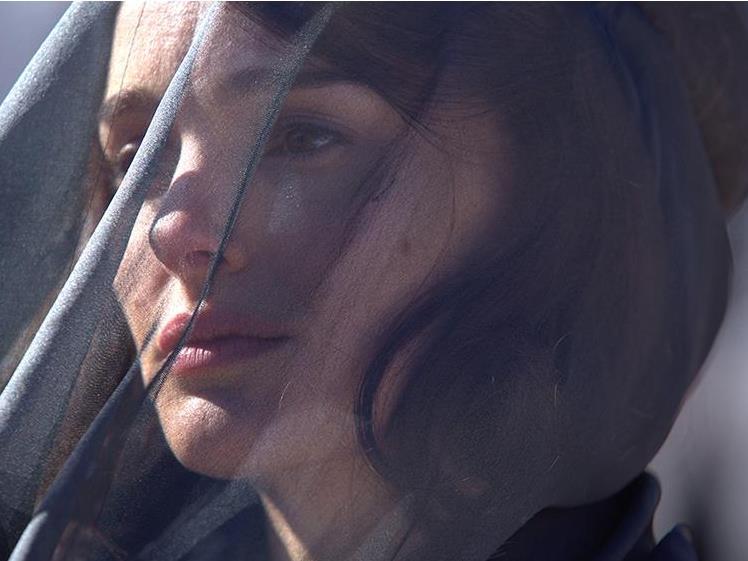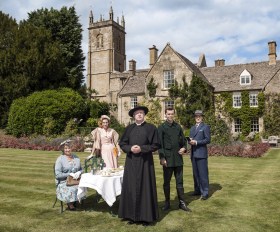Natalie Portman as First Lady Jackie Kennedy in Jackie. Image via eOne.
Too often, history is born of the big and blatant, while the underlying devastation stems from the small and overlooked. The shot extinguishing a president’s life lingers in the mind more than his deeds during two years, ten months and two days in office; the way his wife appears to the watching world proves more important than the extent of the loss that she’s experiencing. Navigating this juxtaposition, where the public show is remembered in broad strokes while the intricate private reality fades from the collective memory, is Jackie’s plight, just as it was for the film’s eponymous First Lady. Crucially, those delivering the latest take on her tale share something else with their subject: they all know exactly what they’re facing.
In a feature directed by Pablo Larraín (Neruda) based on a screenplay by Noah Oppenheim (The Divergent Series: Allegiant), and given flesh, blood, heart, tears and tenacity by lead actress Natalie Portman (Jane Got a Gun), Jackie Kennedy is first spied walking in Hyannis Port, Massachusetts in 1963. Her face remains largely untouched by the rising sunlight, a few stands of her coiffed hair sway slightly out of place, and her expression morphs, ever so subtly, from conflicted to resigned to determined with each step. She’s alone and unguarded, fleetingly. Soon, she’ll meet with the journalist (Billy Crudup, Spotlight) approved to document her account of the day John F. Kennedy (Caspar Phillipson, Villads fra Valby) died. As she moves, Mica Levi’s (Under the Skin) droning score – which will continue to swell and break for the movie’s 99 minutes – betrays her inner turmoil.
As soon as she greets her guest, however, Jackie is ready to compose and impose her view of the preceding week, recognising the significance of her task. “Have you read what they’ve been writing?” are her first words. “You understand that I will be editing this conversation just in case I don’t say exactly what I mean,” she states shortly afterwards. Their chat unfurls in an exchange of questions and sometimes candid, often calculated answers, with Jackie, the film, intertwining the recollections of Jackie, the figure. Among its array of incidents: a televised tour of the White House, her husband’s death and its immediate aftermath, funeral plans, a birthday party, and time spent with her priest (John Hurt, TV’s The Last Panthers), brother-in-law Bobby Kennedy (Peter Sarsgaard, The Magnificent Seven), friend and assistant Nancy Tuckerman (Greta Gerwig, Maggie’s Plan), and confidante Bill Walton (Richard E. Grant, Game of Thrones).
Shifting from Jackie’s present to her past, and employing the necessary change in atmospheric and aesthetic tone to match, the feature flits between the two modes that it seeks to interrogate and dissect. On the record with the journalist, Jackie massages her preferred perception of JFK’s legacy, as she’s also glimpsed doing after the shooting, in the preparations for his memorial, and in the snippets seen during his life. Just as the movie often waits a beat longer than expected throughout the central discussion to expose this process – moments Jackie won’t allow to go to print, of course –it also peers into her eyes and over her shoulder to reveal her internal state during each flashback.
It’s this minutiae, captured on a quest for otherwise unseen but nonetheless character-defining experiences and instances, that pushes Jackie past the realm of standard biopics; that thrusts it into territory innately aware of seemingly the conflicting concepts – that smallest things matter, but so do feelings over facts – that come into play in grief. As always, Jackie herself leads the way, fussing over every iota she can in the most telling manner: “can you tell me what size the bullet was?” she asks on the plane from Dallas; “I want to know all the details,” she implores, when discussing JFK’s autopsy. And so Larraín does the same, seeking to probe deeply while remaining true to the emotions of situation rather than exactly what might’ve transpired. His movie is an interpretation of how the bereaved woman at its core copes and responds, and as purposefully restless in look and in mood yet still attuned to the impact of glances, choices, words and objects as that requires.
Of all of the close encounters the impressionistic effort boasts, and in all of subjective ways Larraín, cinematographer Stéphane Fontaine (Elle) and editor Sebastián Sepúlveda (The Club) shoot, construct, layer and immerse viewers in Jackie’s narrative, never is the film’s intention more clear – or the compelling power of the chief portrayal that it hangs upon – than in its mid-feature sequence. In an instance stripped of pageantry for the crowds, instead offering a private spectacle as a way of conveying pain, Jackie puts on the record she’ll champion as the defining piece of the JFK puzzle, and then wanders around the White House. Listening to the Camelot soundtrack, she steps through rooms, plays dress up in her own attire, smokes and drinks. She cries, surveys her surroundings, packs, and acts as someone suddenly searching, striving, yearning and hurting does without scrutiny.
It’s a centrepiece that arrives like a slap, sudden and stinging, while also feeling like the culmination of an ongoing struggle. For minutes, Portman’s Jackie is disarmingly free – and for the same amount time, the protective, collected character truly doesn’t know what to do. So, Larraín roams and remains nearby, while his star lets the full spectrum of emotion course through her veins. Here, Portman presents Jackie at her most vulnerable; however, like the scene itself, such honesty is only made possible by everything around it. The heartbreaking reality of mourning, of losing a presidential husband, of being forced to stay calm in the spotlight, is laid bare, but Jackie, Portman, Larraín and company never let their entrancing, fascinating portrait lose sight of its causes and consequences.
Rating: 5 stars out of 5
Jackie
Director: Pablo Larraín
Chile | France | USA, 2016, 100 mins
Release date: January 12
Distributor: eOne
Rated: MA
Actors:
Director:
Format:
Country:
Release:





